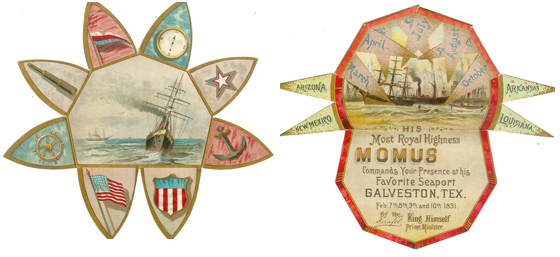Bowling Green native Phineas Hampton Coombs (1869-1919), an executive with the St. Louis Southwestern Railway, had distinctive opportunities for leisure during his postings in Texas, Atlanta and New York. One of the most interesting social invitations he received was a delight for the eyes that promised even more to come.
The intricately colored, multi-sided invitation arrived from “Momus,” the Greek god of satire and jest. Drawing back its eight triangular flaps, the recipient found another, equally eye-catching insert commanding him to be present in Galveston, Texas on February 7-9, 1891 for the city’s Deep Water Jubilee. Images of sailing and steam vessels, nautical flags, masked ladies, musical instruments and an idyllic seashore all beckoned those looking for food, fun and spectacle.
The Deep Water Jubilee was an elaborate festival celebrating the oldest, and at that time the busiest port west of New Orleans. The event featured trade displays, flotillas, seagoing excursions, speeches by visiting dignitaries, parades, banquets and fireworks. In time, other deepwater ports would lessen Galveston’s economic clout, especially after the Great Hurricane of 1900, but today the port remains an embarkation point for cruise ships as well as for industrial, agricultural and military cargo.
Phineas Hampton Coombs’s invitation to Galveston’s Deep Water Jubilee, as well as many other invitations to him and his wife Lattie, are part of the Coombs Family Collection in the Manuscripts & Folklife Archives section of WKU’s Special Collections Library. Click here to access a finding aid. For other collections documenting social activities and leisure in the 19th century, search TopSCHOLAR and KenCat.


